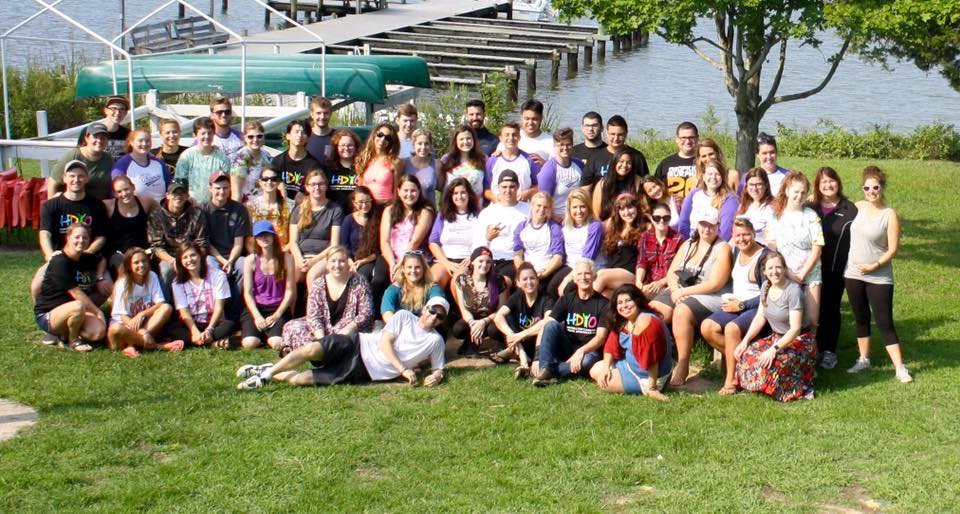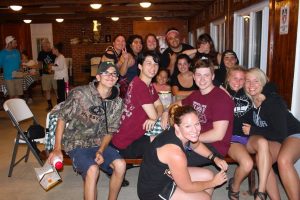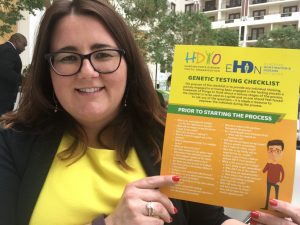HDYO Works Through Camps, Education to Help Young People Affected by Huntington’s

A Huntington's Disease Youth Organization event. (Photo courtesy of HDYO)
Catherine Martin’s mother died from Huntington’s disease. So did her grandmother and a number of aunts, uncles, and cousins. Yet the Scottish woman didn’t get tested for this genetic illness — which she had a 50-50 chance of developing — until she was 30 years old. She tested negative.
“I wasn’t ready,” she said. “I didn’t need to know before then. Once you know, you can’t not know.”
Martin, now 40, is executive director of the Huntington’s Disease Youth Organization (HDYO), which has branches in both the U.S. and U.K. The nonprofit group, established in 2012, aims to provide support for children, teens and adults up to age 35 affected by the disease.
Summer camps, website offer answers
Among other offerings, it runs youth camps for teenagers and young adults touched by Huntington’s. A fourth such free camping event is planned people ages 15 to 23 in the U.S. and Canada in August.
HDYO also maintains a website to help young people and others learn about Huntington’s. The site is divided into seven sections: Kids, Teens, Young Adults, Parents, JHD, Friends, and Professionals. And it offers confidential support through its staff of more than 150 volunteers around the world.
HDYO works with national patient organizations to fund projects, along with philanthropies and individual donors. The organization has a $400,000 annual budget, and its U.S. branch is based at Georgetown University in Washington, D.C.
“The best time to engage young people is now, regardless of the age of onset,” said Martin, who lives in Glasgow. “Young people will increase the engagement of their families. They are much more open, educated and curious about what’s going on, and they want to be part of the solution.”
Martin spoke to Huntington’s Disease News at 2018 World Orphan Drug Congress USA held April 25-27 in Maryland. She said the HDYO website gets more than 500,000 visitors annually, and that users have shared its educational content more than 60,000 times in the past five years.
The group’s Facebook page has nearly 11,000 followers, and its YouTube channel offers 74 educational videos — some of which have been viewed more than 250,000 times. The organization has helped more than 6,000 people in 78 countries, and in 14 languages from Portuguese to Polish.
Huntington’s occurs in about 1 in every 10,000 births. The average life expectancy is 15 years from the age of onset, with symptoms generally starting by the mid-30s. There’s also a juvenile form that strikes young people before their 21st birthday.
“Huntington’s is like having ALS, Parkinson’s and Alzheimer’s all at the same time,” Martin said. “Every individual’s pathway is different. That’s because of the way it changes personalities; some people get psychiatric symptoms, others have involuntary movements. … it progresses differently until the end state, where it’s basically a vegetative state for everybody.”
‘Watching their future unfold’
An estimated 30,000 Americans have Huntington’s, with others at risk given their family histories. Medications available improve a patient’s quality of life, but don’t extend life.
“There are also environmental factors that impact progression of the disease, but not the disease itself,” Martin said, noting a particularly high prevalence of Huntington’s in South America.
“When we set the organization up, there was no information or support for young people living with Huntington’s,” she said. “The camp is for young caregivers who are caring for multiple family members dying of Huntington’s, so they continually go through the process of loss.
“They watch their future unfold in front of them.”
Martin said some HDYO members have been tested for the disease. Others haven’t, because they don’t want to know.
“We advocate for their right to an informed choice about testing,” she said. “When is it right for them? Have they got everything in place?
“We speak to them about what to do before starting the process,” she said, displaying a yellow “Genetic Testing Checklist” for those considering screening.
Questions to consider include:
- What is my motivation for testing? Is this the right time in my life?
- Who will know my results and have access to them?
- Are there any laws about communicating my results with my family?
- Will there be an impact on my career?
- Is there a way to have children without Huntington’s if I test positive?
“What’s amazing is all these young people want someone to hear their stories and understand what they’re going through. That’s their comfort,” she said. “It’s a huge relief for them, because it takes away the isolation. When someone understands them, it changes their whole demeanor. That’s why these camps and seminars are hugely important.”
So far, the organization has hosted nine such camps — four in Europe (Norway, Spain, Sweden, and the U.K.), three in the United States (the fourth, in California, is set for August), and two in Australia. Five of the nine hosted by HDYO were funded by pharmaceutical firms, including Ionis, Roche, WaveLife Science, UniQor, and Teva.
“At each of the camps, we have a whole day dedicated to research and science,” she said. “That’s why these young people are so motivated. They understand that there’s this huge team of scientists who could save their lives.”








